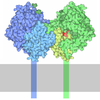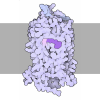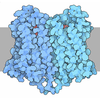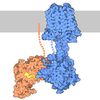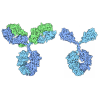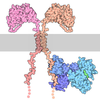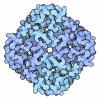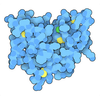+ Open data
Open data
- Basic information
Basic information
| Entry | Database: PDB / ID: 8xxh | ||||||
|---|---|---|---|---|---|---|---|
| Title | Structure of CXCR2 bound to CXCL2 (CXCR2-CXCL2-Go Full map) | ||||||
 Components Components |
| ||||||
 Keywords Keywords | SIGNALING PROTEIN/IMMUNE SYSTEM / GPCR / Arrestin / SIGNALING PROTEIN-IMMUNE SYSTEM complex | ||||||
| Function / homology |  Function and homology information Function and homology informationinterleukin-8-mediated signaling pathway / interleukin-8 receptor activity / mast cell granule / interleukin-8 binding / C-X-C chemokine receptor activity / neutrophil activation / C-C chemokine receptor activity / mu-type opioid receptor binding / C-C chemokine binding / corticotropin-releasing hormone receptor 1 binding ...interleukin-8-mediated signaling pathway / interleukin-8 receptor activity / mast cell granule / interleukin-8 binding / C-X-C chemokine receptor activity / neutrophil activation / C-C chemokine receptor activity / mu-type opioid receptor binding / C-C chemokine binding / corticotropin-releasing hormone receptor 1 binding / vesicle docking involved in exocytosis / chemokine activity / Chemokine receptors bind chemokines / dendritic cell chemotaxis / G protein-coupled dopamine receptor signaling pathway / regulation of heart contraction / parallel fiber to Purkinje cell synapse / Interleukin-10 signaling / cellular defense response / postsynaptic modulation of chemical synaptic transmission / neutrophil chemotaxis / G protein-coupled serotonin receptor binding / adenylate cyclase regulator activity / adenylate cyclase-inhibiting serotonin receptor signaling pathway / secretory granule membrane / muscle contraction / locomotory behavior / calcium-mediated signaling / response to molecule of bacterial origin / negative regulation of insulin secretion / G protein-coupled receptor activity / receptor internalization / GABA-ergic synapse / adenylate cyclase-modulating G protein-coupled receptor signaling pathway / G-protein beta/gamma-subunit complex binding / Olfactory Signaling Pathway / chemotaxis / Activation of the phototransduction cascade / G beta:gamma signalling through PLC beta / Presynaptic function of Kainate receptors / Thromboxane signalling through TP receptor / G protein-coupled acetylcholine receptor signaling pathway / Activation of G protein gated Potassium channels / Inhibition of voltage gated Ca2+ channels via Gbeta/gamma subunits / G-protein activation / G beta:gamma signalling through CDC42 / Prostacyclin signalling through prostacyclin receptor / Glucagon signaling in metabolic regulation / G beta:gamma signalling through BTK / Synthesis, secretion, and inactivation of Glucagon-like Peptide-1 (GLP-1) / ADP signalling through P2Y purinoceptor 12 / photoreceptor disc membrane / mitotic spindle / Sensory perception of sweet, bitter, and umami (glutamate) taste / Glucagon-type ligand receptors / Adrenaline,noradrenaline inhibits insulin secretion / Vasopressin regulates renal water homeostasis via Aquaporins / Glucagon-like Peptide-1 (GLP1) regulates insulin secretion / G alpha (z) signalling events / ADP signalling through P2Y purinoceptor 1 / cellular response to catecholamine stimulus / ADORA2B mediated anti-inflammatory cytokines production / G beta:gamma signalling through PI3Kgamma / adenylate cyclase-activating dopamine receptor signaling pathway / Cooperation of PDCL (PhLP1) and TRiC/CCT in G-protein beta folding / GPER1 signaling / G-protein beta-subunit binding / cellular response to prostaglandin E stimulus / heterotrimeric G-protein complex / Inactivation, recovery and regulation of the phototransduction cascade / G alpha (12/13) signalling events / extracellular vesicle / sensory perception of taste / Thrombin signalling through proteinase activated receptors (PARs) / signaling receptor complex adaptor activity / microtubule cytoskeleton / positive regulation of cytosolic calcium ion concentration / presynaptic membrane / G protein activity / retina development in camera-type eye / cell body / GTPase binding / Ca2+ pathway / fibroblast proliferation / High laminar flow shear stress activates signaling by PIEZO1 and PECAM1:CDH5:KDR in endothelial cells / G alpha (i) signalling events / G alpha (s) signalling events / phospholipase C-activating G protein-coupled receptor signaling pathway / G alpha (q) signalling events / Hydrolases; Acting on acid anhydrides; Acting on GTP to facilitate cellular and subcellular movement / postsynaptic membrane / Ras protein signal transduction / cell surface receptor signaling pathway / Extra-nuclear estrogen signaling / cell population proliferation / immune response / G protein-coupled receptor signaling pathway / inflammatory response / external side of plasma membrane / lysosomal membrane Similarity search - Function | ||||||
| Biological species |  Homo sapiens (human) Homo sapiens (human) | ||||||
| Method | ELECTRON MICROSCOPY / single particle reconstruction / cryo EM / Resolution: 2.8 Å | ||||||
 Authors Authors | Sano, F.K. / Saha, S. / Sharma, S. / Ganguly, M. / Shihoya, W. / Nureki, O. / Shukla, A.K. / Banerjee, R. | ||||||
| Funding support |  India, 1items India, 1items
| ||||||
 Citation Citation |  Journal: Mol Cell / Year: 2025 Journal: Mol Cell / Year: 2025Title: Molecular basis of promiscuous chemokine binding and structural mimicry at the C-X-C chemokine receptor, CXCR2. Authors: Shirsha Saha / Fumiya K Sano / Saloni Sharma / Manisankar Ganguly / Sudha Mishra / Annu Dalal / Hiroaki Akasaka / Takaaki A Kobayashi / Nashrah Zaidi / Divyanshu Tiwari / Nabarun Roy / ...Authors: Shirsha Saha / Fumiya K Sano / Saloni Sharma / Manisankar Ganguly / Sudha Mishra / Annu Dalal / Hiroaki Akasaka / Takaaki A Kobayashi / Nashrah Zaidi / Divyanshu Tiwari / Nabarun Roy / Manish K Yadav / Nilanjana Banerjee / Sayantan Saha / Samanwita Mohapatra / Yuzuru Itoh / Andy Chevigné / Ramanuj Banerjee / Wataru Shihoya / Osamu Nureki / Arun K Shukla /   Abstract: Selectivity of natural agonists for their cognate receptors is a hallmark of G-protein-coupled receptors (GPCRs); however, this selectivity often breaks down at the chemokine receptors. Chemokines ...Selectivity of natural agonists for their cognate receptors is a hallmark of G-protein-coupled receptors (GPCRs); however, this selectivity often breaks down at the chemokine receptors. Chemokines often display promiscuous binding to chemokine receptors, but the underlying molecular determinants remain mostly elusive. Here, we perform a comprehensive transducer-coupling analysis, testing all known C-X-C chemokines on every C-X-C type chemokine receptor to generate a global fingerprint of the selectivity and promiscuity encoded within this system. Taking lead from this, we determine cryoelectron microscopy (cryo-EM) structures of the most promiscuous receptor, C-X-C chemokine receptor 2 (CXCR2), in complex with several chemokines. These structural snapshots elucidate the details of ligand-receptor interactions, including structural motifs, which are validated using mutagenesis and functional experiments. We also observe that most chemokines position themselves on CXCR2 as a dimer while CXCL6 exhibits a monomeric binding pose. Taken together, our findings provide the molecular basis of chemokine promiscuity at CXCR2 with potential implications for developing therapeutic molecules. | ||||||
| History |
|
- Structure visualization
Structure visualization
| Structure viewer | Molecule:  Molmil Molmil Jmol/JSmol Jmol/JSmol |
|---|
- Downloads & links
Downloads & links
- Download
Download
| PDBx/mmCIF format |  8xxh.cif.gz 8xxh.cif.gz | 232.9 KB | Display |  PDBx/mmCIF format PDBx/mmCIF format |
|---|---|---|---|---|
| PDB format |  pdb8xxh.ent.gz pdb8xxh.ent.gz | 178.9 KB | Display |  PDB format PDB format |
| PDBx/mmJSON format |  8xxh.json.gz 8xxh.json.gz | Tree view |  PDBx/mmJSON format PDBx/mmJSON format | |
| Others |  Other downloads Other downloads |
-Validation report
| Arichive directory |  https://data.pdbj.org/pub/pdb/validation_reports/xx/8xxh https://data.pdbj.org/pub/pdb/validation_reports/xx/8xxh ftp://data.pdbj.org/pub/pdb/validation_reports/xx/8xxh ftp://data.pdbj.org/pub/pdb/validation_reports/xx/8xxh | HTTPS FTP |
|---|
-Related structure data
| Related structure data |  38749MC  8xvuC  8xwaC  8xwfC  8xwmC  8xwnC  8xwsC 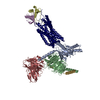 8xwvC  8xx3C  8xx6C  8xx7C  8xxrC 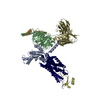 8xxxC M: map data used to model this data C: citing same article ( |
|---|---|
| Similar structure data | Similarity search - Function & homology  F&H Search F&H Search |
- Links
Links
- Assembly
Assembly
| Deposited unit | 
|
|---|---|
| 1 |
|
- Components
Components
-Guanine nucleotide-binding protein ... , 3 types, 3 molecules ABG
| #1: Protein | Mass: 27024.762 Da / Num. of mol.: 1 / Mutation: G42D, E43N, A227D, G230D, I332A, V335I Source method: isolated from a genetically manipulated source Source: (gene. exp.)  Homo sapiens (human) / Gene: GNAO1 / Production host: Homo sapiens (human) / Gene: GNAO1 / Production host:  |
|---|---|
| #2: Protein | Mass: 38534.062 Da / Num. of mol.: 1 Source method: isolated from a genetically manipulated source Source: (gene. exp.)  Homo sapiens (human) / Gene: GNB1 / Production host: Homo sapiens (human) / Gene: GNB1 / Production host:  |
| #3: Protein | Mass: 7861.143 Da / Num. of mol.: 1 Source method: isolated from a genetically manipulated source Source: (gene. exp.)  Homo sapiens (human) / Gene: GNG2 / Production host: Homo sapiens (human) / Gene: GNG2 / Production host:  |
-Protein , 2 types, 3 molecules RDE
| #5: Protein | Mass: 46699.609 Da / Num. of mol.: 1 Source method: isolated from a genetically manipulated source Source: (gene. exp.)  Homo sapiens (human) / Gene: CXCR2 / Production host: Homo sapiens (human) / Gene: CXCR2 / Production host:  |
|---|---|
| #6: Protein | Mass: 7905.440 Da / Num. of mol.: 2 Source method: isolated from a genetically manipulated source Source: (gene. exp.)  Homo sapiens (human) / Gene: CXCL2 / Production host: Homo sapiens (human) / Gene: CXCL2 / Production host:  |
-Antibody , 1 types, 1 molecules S
| #4: Antibody | Mass: 26466.486 Da / Num. of mol.: 1 Source method: isolated from a genetically manipulated source Source: (gene. exp.)   |
|---|
-Details
| Has protein modification | Y |
|---|
-Experimental details
-Experiment
| Experiment | Method: ELECTRON MICROSCOPY |
|---|---|
| EM experiment | Aggregation state: PARTICLE / 3D reconstruction method: single particle reconstruction |
- Sample preparation
Sample preparation
| Component | Name: C-X-C chemokine receptor type 2 in complex with C-X-C motif chemokine 2 and Go Type: COMPLEX / Entity ID: all / Source: RECOMBINANT |
|---|---|
| Molecular weight | Experimental value: NO |
| Source (natural) | Organism:  Homo sapiens (human) Homo sapiens (human) |
| Source (recombinant) | Organism:  |
| Buffer solution | pH: 7.4 |
| Specimen | Embedding applied: NO / Shadowing applied: NO / Staining applied: NO / Vitrification applied: YES |
| Vitrification | Cryogen name: ETHANE |
- Electron microscopy imaging
Electron microscopy imaging
| Experimental equipment |  Model: Titan Krios / Image courtesy: FEI Company |
|---|---|
| Microscopy | Model: FEI TITAN KRIOS |
| Electron gun | Electron source:  FIELD EMISSION GUN / Accelerating voltage: 300 kV / Illumination mode: FLOOD BEAM FIELD EMISSION GUN / Accelerating voltage: 300 kV / Illumination mode: FLOOD BEAM |
| Electron lens | Mode: BRIGHT FIELD / Nominal defocus max: 1600 nm / Nominal defocus min: 800 nm / Cs: 2.7 mm |
| Specimen holder | Cryogen: NITROGEN / Specimen holder model: FEI TITAN KRIOS AUTOGRID HOLDER |
| Image recording | Electron dose: 50.2 e/Å2 / Detector mode: COUNTING / Film or detector model: GATAN K3 (6k x 4k) |
| Image scans | Movie frames/image: 40 |
- Processing
Processing
| EM software |
| ||||||||||||||||||||||||||||
|---|---|---|---|---|---|---|---|---|---|---|---|---|---|---|---|---|---|---|---|---|---|---|---|---|---|---|---|---|---|
| CTF correction | Type: NONE | ||||||||||||||||||||||||||||
| Particle selection | Num. of particles selected: 1927680 | ||||||||||||||||||||||||||||
| 3D reconstruction | Resolution: 2.8 Å / Resolution method: FSC 0.143 CUT-OFF / Num. of particles: 285884 / Symmetry type: POINT | ||||||||||||||||||||||||||||
| Atomic model building | Protocol: FLEXIBLE FIT / Space: REAL | ||||||||||||||||||||||||||||
| Atomic model building | Source name: SwissModel / Type: in silico model |
 Movie
Movie Controller
Controller















 PDBj
PDBj